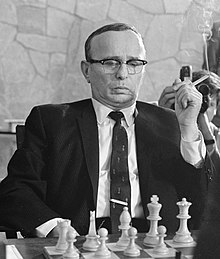Sammy Reshevsky
| Samuel Reshevsky | |
|---|---|

Reshevsky in 1968
|
|
| Full name | Samuel Herman Reshevsky |
| Country | United States Poland |
| Born |
November 26, 1911 Ozorków, Congress Poland, Russian Empire |
| Died | April 4, 1992 (aged 80) New York City |
| Title | Grandmaster (1950) |
| Peak rating | 2565 (July 1972) |
Samuel "Sammy" Herman Reshevsky (born Szmul Rzeszewski; November 26, 1911 – April 4, 1992) was a Polish chess prodigy and later a leading American chess grandmaster. He was never a full-time chess professional. He was a strong contender for the World Chess Championship from the mid-1930s to the mid-1960s: he tied for third place in the 1948 World Chess Championship tournament, and tied for second in the 1953 Candidates Tournament. He was an eight-time winner of the U.S. Chess Championship. An outstanding match player throughout his career, Reshevsky excelled at positional play, and could be a brilliant tactician when required. He took a long time over his opening moves, and often found himself in time pressure, but this sometimes unsettled his opponent more than it did Reshevsky.
He was an accountant by profession, and a well-regarded chess writer.
Reshevsky was born at Ozorków near Łódź, Poland, to a Jewish family. He learned to play chess at age four and was soon acclaimed as a child prodigy. At age eight, he was beating many accomplished players with ease and giving simultaneous exhibitions. In November 1920, his parents moved to the U.S. to make a living by publicly exhibiting their child's talent. Reshevsky played thousands of games in exhibitions all over the U.S. He played in the 1922 New York Masters tournament; at that stage, he was likely the youngest-ever player to have competed in a strong tournament.
For a period in his youth, Reshevsky did not attend school, for which his parents appeared in District Court in Manhattan facing a charge of improper guardianship. However, Julius Rosenwald, wealthy co-owner of Sears, Roebuck and Company in Chicago, soon afterwards became Reshevsky's benefactor, and he guaranteed Reshevsky's future on the condition that he would complete his education.
...
Wikipedia
